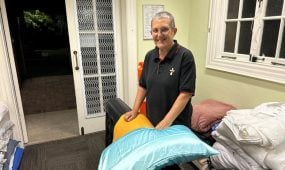"Simply because they were human, I admire"
Justice & Advocacy
“Yet, whilst the young woman’s friend will not be remembered at a funeral, other than through the short funeral-like service we created during our simple ceremony of lighting a candle and saying a prayer, the fact that she was able to share his story with me, and the value she placed on his friendship and love, serves as a reminder that those who the mainstream might label as hopeless are valuable contributors to the lives of those who truly know them,” says The Very Rev’d Dr Peter Catt

At this particular time I have no one
Particular person to grieve for, though there must
Be many, many unknown ones going to dust
Slowly, not remembered for what they have done
Or left undone. For these, then, I will grieve
Being impartial, unable to deceive.
How they lived, or died, is quite unknown,
And, by that fact gives my grief purity—
An important person quite apart from me
Or one obscure who drifted down alone.
Both or all I remember, have a place.
For these I never encountered face to face.
Sentiment will creep in. I cast it out
Wishing to give these classical repose,
No epitaph, no poppy and no rose
From me, and certainly no wish to learn about
The way they lived or died. In earth or fire
They are gone. Simply because they were human, I admire.
By Elizabeth Jennings, “In Memory Of Anyone Unknown To Me”
Two of our rough sleepers have died in the past two weeks. They did not die at the Cathedral site, but within a few days of being here.
Just over a week ago a young lady called into the Cathedral and asked me to bless her new rosary beads. When we had finished, she asked me if I could say a prayer for a friend of hers who had died. She talked of this friend’s kindness and of the deep friendship that they had shared. She also talked of how she was with him when he dropped dead as they walked along the street. She then told me his name. He was one of the rough sleepers who had died. We lit a candle and gave thanks for his life, for his kindness and the hole left in the lives of his friends.
Advertisement
The second of our rough sleepers died in his sleep, probably of hypothermia, in a suburban Brisbane garden.
More than likely neither will be remembered at a funeral. The State pays a contractor to undertake the respectful, but no frills (a funeral being a frill), disposal of the bodies of those who die without means.
In early 2024 The Guardian published a story following a year-long investigation into the deaths of 627 homelessness people. It revealed that Australians experiencing homelessness have an average life expectancy of just 44 years (45.2 for men and 40.1 for women), which is more than 30 years lower than the median age at death for the general population. Note the substantially lower life-expectancy for women compared to men, the reverse of the situation found in the wider community.
Other than when an investigative journalist looks at it, the issue of reduced life expectancy for those who sleep rough does not get much attention. It is something of an invisible pandemic.
The homeless, the fact they exist at all and their plight, serve as reminders that our society does not regard everyone of being of equal value. Their unreported deaths and the reduced life expectancy do not cause ripples in society. Without knowing the complexity of their stories, we still hear people speak of the homeless in dismissive terms, such as hopeless, and blaming them for their plight.
Advertisement
Yet, whilst the young woman’s friend will not be remembered at a funeral, other than through the short funeral-like service we created during our simple ceremony of lighting a candle and saying a prayer, the fact that she was able to share his story with me, and the value she placed on his friendship and love, serves as a reminder that those who the mainstream might label as hopeless are valuable contributors to the lives of those who truly know them.
Given that homeless women fare more poorly than men, it is timely that this month’s Outreach through Offerings project is The Forgotten Women. The Forgotten Women is a unique, grassroots housing initiative for homeless women over 55. This not-for-profit project mission is to put a roof over the heads of as many of these vulnerable women as possible. Through the acquisition of suitable properties, The Forgotten Women project will ensure these women have access to secure, safe and affordable housing options that enable them to age in place with dignity and security. For more details check out the information in Monthly Notices and on the Home Page of the Cathedral’s website.
Simply because they were human, I admire.
Editor’s note: First published in the St John’s Cathedral Weekly News on 12 August 2024.






